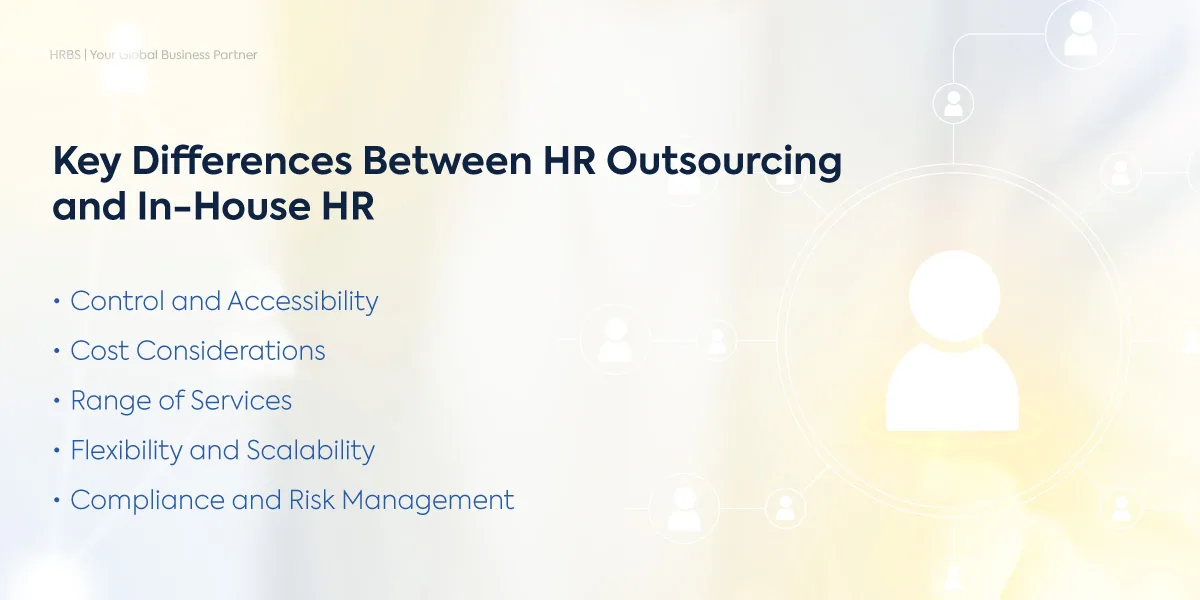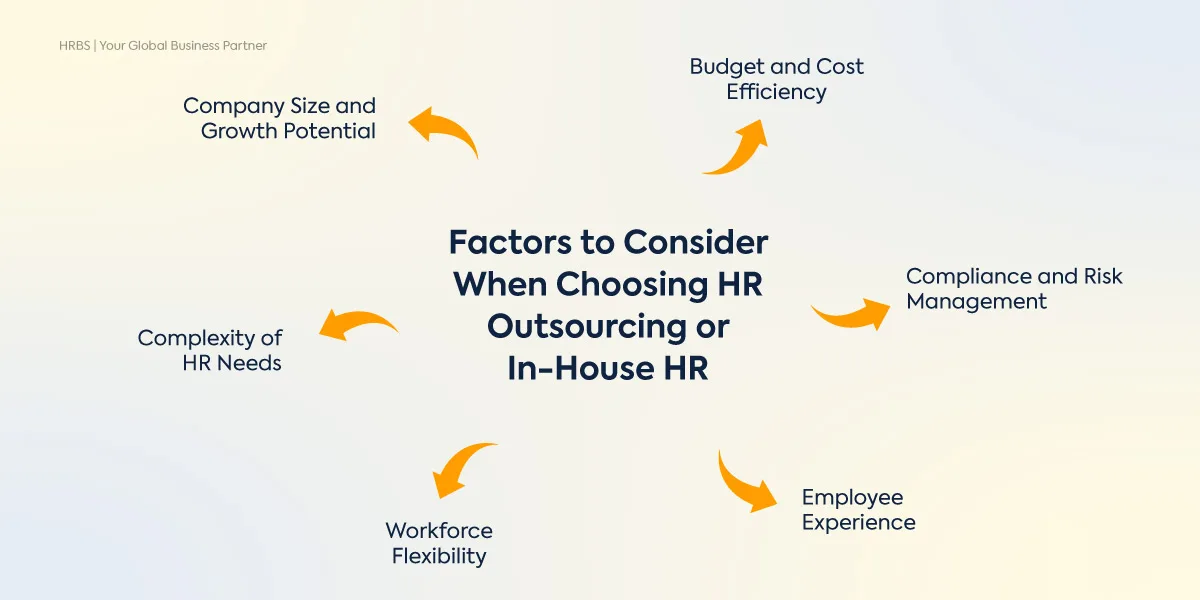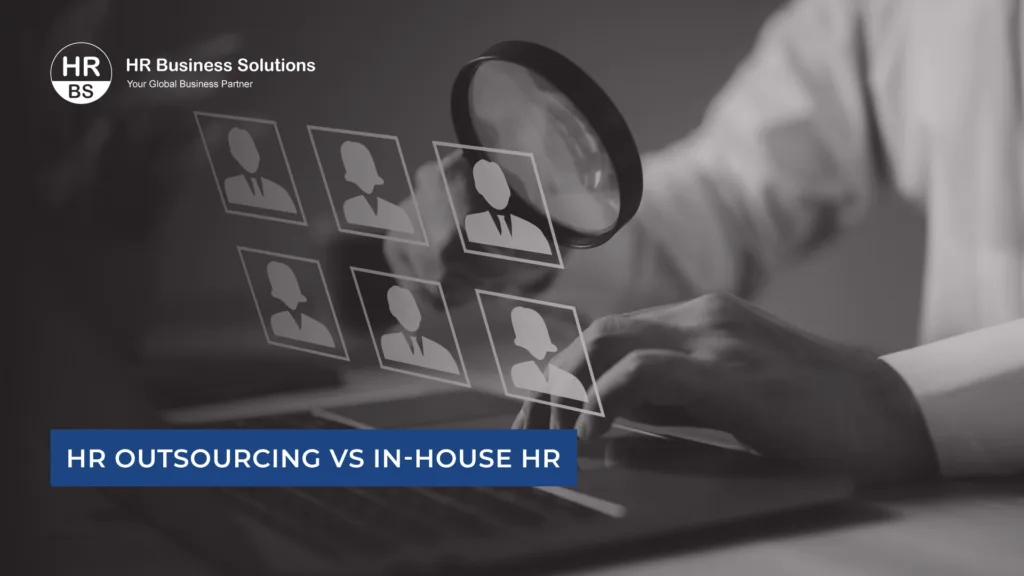The human resource outsourcing (HRO) market is rapidly expanding, valued at approximately USD 20 billion and expected to grow by 50% to reach USD 31 billion by 2030. Companies that outsource HR functions report up to 30% reductions in operating costs and significant improvements in efficiency and employee satisfaction.Many growing companies face rising HR demands that go beyond everyday tasks. Keeping up with changing employment laws, addressing employee concerns, and maintaining a positive work environment can overwhelm small HR teams. When HR responsibilities pile up, they slow down your focus on core business activities and impact employee satisfaction.
This often leads companies to consider whether expanding their internal HR team or outsourcing HR functions better suits their needs. The right choice depends on factors such as company size, specific HR needs, and long-term business goals. Understanding how each option affects your ability to manage recruitment challenges, stay compliant with employment regulations, and support employee engagement will help you make the best decision. This article explores the key differences between HR outsourcing and in-house HR, guiding you to find the best solution for your business needs and future success.
What is In-House HR?
In-house HR means having a dedicated human resource team or professional within your company who handles all HR tasks. This includes recruiting and hiring employees, managing payroll and employee benefits, handling employee relations, conducting performance reviews, and ensuring workplace safety. An in-house HR team works closely with both employees and management, offering direct support and quick responses to workplace issues. This close connection helps maintain a strong company culture and ensures HR practices align with your business values and goals. Companies with internal HR often see higher employee trust, faster resolution of problems, and better employee retention. Managing recruitment, compliance, and employee engagement in-house keeps HR processes closely tied to your company’s daily operations and workforce management.
When to Use In-House HR
- When building close, personal relationships with employees is essential to foster trust, engagement, and a positive workplace culture.
- When you need immediate, hands-on management of employee performance, training, and workplace issues with confidentiality.
- If your company size supports dedicated HR staff, in-house HR ensures policies align with your culture, operational goals, and workforce needs.
- When protecting sensitive employee data and maintaining control over HR processes is a priority to reduce risks related to data breaches.
- When you want consistent enforcement of company policies and fast decision-making on employee matters to maintain a stable work environment.
What is HR Outsourcing?
HR outsourcing involves hiring an external company to handle some or all HR functions, such as payroll processing, recruitment, employee benefits administration, compliance with labor laws, and employee training. Partnering with third-party HR specialists gives your business access to expert knowledge, advanced HR technology, and updated compliance practices that many small or mid-sized companies may lack internally. Outsourcing reduces the risk of costly compliance errors and lightens your administrative load, allowing your internal team to focus on core business activities. Many businesses report faster hiring processes and improved employee benefits management when they outsource HR functions. By outsourcing recruitment and payroll, companies can also handle seasonal or rapid growth demands more efficiently. This approach ensures your HR stays current with labor regulations while improving overall workforce management.
When to Use HR Outsourcing
- When your HR team spends too much time on payroll processing, benefits administration, and compliance management, outsourcing lets them focus on core business tasks.
- If keeping up with changing employment laws and labor regulations is challenging, outsourcing connects you with HR compliance experts who reduce legal risks and penalties.
- When your workforce fluctuates due to seasonal hiring or urgent recruitment needs, outsourcing provides scalable, flexible HR services tailored to your business demands.
- If your recruitment process lacks reach or speed, outsourcing leverages advanced talent acquisition tools and broader candidate pools to improve hiring quality and reduce time-to-fill.
- When you want accurate employee benefits management and faster HR support, outsourcing delivers professional administration that minimizes errors and improves employee satisfaction.

Key Differences Between HR Outsourcing and In-House HR
Which Businesses Benefit Most From Each Model?Deciding between HR outsourcing and building an in-house HR team is a critical choice that impacts how your business handles employee management, compliance, and growth. Both options cover important HR functions but serve different needs. Here’s what you should know to make an informed decision.
Control and Accessibility
With an in-house HR team, you get immediate access to HR professionals who understand your company culture and can quickly address employee concerns. This direct interaction helps build trust and ensures HR policies reflect your business values.
Outsourcing HR means working with external experts who manage your HR functions remotely. While you might not have instant access, these specialists bring broad experience and use the latest HR technology to keep your processes efficient and compliant.
Cost Considerations
Hiring and maintaining an in-house HR team involves ongoing costs—salaries, benefits, training, and HR tools. For smaller businesses, these expenses can add up quickly.
Outsourcing HR can be more cost-effective, especially if your HR needs fluctuate. You pay for the specific services you use, which helps control expenses. Plus, outsourcing reduces risks linked to compliance errors, potentially saving you from costly fines.
Range of Services
In-house HR teams handle everything from recruiting and onboarding to employee relations, performance management, and legal compliance. Their deep knowledge of your company allows them to tailor HR policies and respond to issues with a personal touch.
Outsourced HR providers typically offer flexible service packages. You can choose to outsource payroll, recruitment, benefits management, or all HR functions depending on your needs. This flexibility is valuable if your business experiences seasonal hiring or rapid growth.
Flexibility and Scalability
Outsourcing HR gives you the ability to scale services up or down quickly. This is ideal for companies with fluctuating workforce sizes or those entering new markets.
In-house HR teams require time and resources to grow or shrink, which can slow your response to changing business demands.
Compliance and Risk Management
Labor laws and employment regulations change frequently. In-house HR teams may struggle to stay fully updated, increasing the risk of compliance mistakes. Outsourced HR firms specialize in compliance and monitor regulatory changes closely. They help protect your business by ensuring payroll, benefits, and workplace policies meet legal requirements.
Pros and Cons of HR Outsourcing vs. In-House HR
Here’s a simple table to help you quickly compare the advantages and disadvantages of HR outsourcing and in-house HR. This will help you decide which option fits your business needs better.
| Aspect | HR Outsourcing – Pros | HR Outsourcing – Cons | In-House HR – Pros | In-House HR – Cons |
| Cost | Pay per service; can save money | Can get costly if overused | Fixed and predictable costs | Higher ongoing expenses |
| Expertise | Access to HR specialists | Less control over staff | Knows company well | May lack specialized skills |
| Control | Frees internal team | Slower communication | Quick access and control | Hard to scale fast |
| Flexibility | Easy to scale up/down | May not fit company culture | Strong culture fit | Slow to adjust team size |
| Compliance | Keeps up with laws | Depends on vendor reliability | Full control | Risk of missing updates |
| Recruitment | Larger talent pool | Less control over hiring | Personalized hiring | Smaller reach |
| Employee Care | Professional handling | Less personal | Builds trust | Resource-heavy |

Factors to Consider When Choosing HR Outsourcing or In-House HR
When choosing between HR outsourcing and an in-house HR team, it’s important to focus on what truly fits your business needs. Here are key factors to consider, backed by real insights to help you make an informed decision and improve your search visibility:
- Company Size and Growth Potential: Smaller businesses and startups often benefit from HR outsourcing because it provides access to professional HR services without the overhead of hiring full-time staff. According to industry reports, businesses that outsource HR functions can reduce HR costs by up to 30% while gaining flexibility to scale during growth phases. Larger companies with stable workforces usually prefer in-house HR teams to maintain close control and foster company culture.
- Budget and Cost Efficiency: In-house HR requires fixed costs such as salaries, benefits, office space, and training. Outsourcing typically operates on a pay-as-you-go model, which can lower upfront costs and reduce expenses related to compliance errors. Research shows that outsourcing payroll and benefits administration alone can save companies significant time and money, freeing internal teams to focus on strategic initiatives.
- Complexity of HR Needs: If your business faces complex HR challenges – like navigating labor laws, managing employee benefits, or handling workplace investigations – outsourcing connects you with specialists who stay updated on regulations. This reduces legal risks and penalties. For businesses with straightforward HR needs, an in-house team can efficiently manage daily tasks and employee relations.
- Workforce Flexibility: Outsourcing HR offers scalability, allowing you to adjust services based on seasonal hiring or rapid workforce changes. This flexibility is crucial for industries with fluctuating labor demands, such as retail or hospitality. In contrast, in-house HR teams provide consistent, personalized support and play a key role in shaping company culture, which is vital for employee engagement and retention.
- Compliance and Risk Management: HR compliance is a major concern for all businesses. Outsourced providers specialize in staying current with federal, state, and local employment laws, minimizing the risk of costly fines. In-house teams must dedicate time and resources to compliance training and updates, which can be challenging without dedicated experts.
- Employee Experience: An in-house HR team can build stronger relationships with employees, offering immediate support and fostering a positive work environment. Outsourcing handles routine HR functions efficiently but may lack the personal touch that contributes to employee satisfaction and loyalty.
Conclusion
Choosing between HR outsourcing and an in-house HR team depends largely on your company’s size, budget, and specific HR requirements. Many businesses today choose to outsource at least part of their HR functions to reduce overhead costs and increase operational efficiency. Outsourcing helps lower expenses related to payroll processing, benefits administration, and compliance management, while also improving employee satisfaction by providing faster, more accurate HR support. This leads to stronger employee retention and a more stable workforce.
At HRBS, we tailor our HR outsourcing services to fit your unique business needs. Whether you require help with recruitment, payroll, compliance, or employee engagement, our solutions allow you to focus on growing your business. We ensure your HR processes run smoothly, remain compliant with evolving labor laws, and support a positive workplace environment—helping you reduce risks and improve overall workforce management.
FAQ’s
What HR functions do companies commonly outsource?
Most companies outsource payroll, recruitment, employee training, benefits administration, and compliance management to access expert support and reduce costs. HRBS offers flexible service packages that can be customized to meet your specific business needs.
How does HR outsourcing improve employee satisfaction?
Outsourcing firms like HRBS bring specialized expertise and technology that streamline HR processes, leading to faster responses and better benefits management. This professional support often results in higher employee engagement and retention.
Is HR outsourcing cost-effective for small businesses?
Yes. Outsourcing reduces fixed HR costs like salaries and training, making professional HR services affordable and scalable for small and growing businesses.
Can outsourcing HR help with compliance risks?
Absolutely. HR outsourcing providers stay updated on labor laws and regulations, reducing the risk of costly compliance errors and legal penalties.
How quickly can HR outsourcing scale with my business needs?
HR outsourcing offers flexible services that can expand or contract based on your workforce size and seasonal demands, helping you manage growth or downsizing efficiently.


